Sandy Barker's Blog, page 15
December 28, 2018
New Year’s Absolutions 2019
Those who have followed my blog for a while will know I don’t write New Year’s Resolutions. I do set goals from time-to-time, but the pressure we place on those resolutions can be stifling at best and paralysing at worst, and I refuse to start off a sparkly new year by tainting it with pressure.
Instead, I write ‘absolutions’ – those things I absolve myself from doing. And, a little like wishing for more wishes, I first absolve myself from writing resolutions. Then I consider what things I want to take off my looming to-do list.
For 2019, I hereby absolve myself of the following:
Joining Instagram
If I had a dollar for every time someone has said, “You should be on Instagram!” I could have funded this year’s sabbatical without dipping into savings. I am a travelling author. Apparently, Instagram is the perfect platform for me. But, is it? I have this blog (with it’s additional pages about my books). I have a Facebook author page, and I have grown my Twitter followers from 300 (in March this year) to 2000. I also have author pages on Goodreads and Amazon. I have enough on my social media plate.
[image error]
Finishing the Outlander books
This is a hard one for me, because I love this series. Once I watched season one of the TV show, I picked up the books. I read #1-6 over a year, interspersed between other books. They are incredibly well written – both great storytelling and stunning prose. They are also a huge time commitment as they average 1000 pages each. But I’m stuck on book seven. It follows too many characters besides Jamie and Claire, and I got into the series because I loved their story. I am (mostly) enjoying season 4 of the TV show, by the way.
[image error]
Season Four
Getting into Virtual Reality
This is also a hard one for me, because VR is really frigging cool. And, my partner, Ben, has a full rig back home in Melbourne, including a steering wheel and pedals for driving. There have been many times when I’ve returned home to find him fully kitted-out and doing battle with unseen enemies or racing around a track in Italy.
It looks incredible, and I LOVED my ten minutes in the Google Earth VR world. But VR gives me the kind of motion sickness that stays with me for hours – nausea, dizziness, a mild headache. It breaks my heart a little, but I promise to go back to it, when they improve it to the point where it doesn’t make me sick.
[image error]
NOT actual footage of me
Getting to the bottom of my TBR pile
If my ‘to be read’ pile was made up of physical books and it fell on me in the night, it would kill me.
On my Kindle, it makes up ten pages of covers. Some of those covers represent samples of books I want to check out (at some point), some are must-reads by favourite authors, some are must-reads by my author friends. I know I will never really get to the bottom of that pile – I’d have to take up reading as a full-time job – so I absolve myself. My current priority when I finish a book is to scroll through those covers and seek out the books written by my author friends. I get to read across genres, and I get to connect with them on a new level.
[image error]
Going grey
I had this one on last year’s list, too. And believe me, I have seriously considered removing it from the list in 2018, because I’ve maintained my brunette status while living abroad. But I am still not ready to embrace my silver vixen status, especially as my options are grow it out (NOOOOOOOO), cut it all off and start again (NOOOOOOOO), or pay oodles of dollars over many months to have a pro do it (HMMMMMMM). Maybe in a year or seven.
[image error]
Stacy London is fabulous
Whatever your resolutions or absolutions are, I wish you a peaceful, happy, successful, adventurous, challenging, exciting, and lovely 2019.
November 30, 2018
The home stretch of sabbatical life
In 1979 and 1980, my dad and his then-partner embarked on long-term travel. Their trip included a 3-month drive from Cape Town to Cairo on a giant pink truck with a handful of other travellers, working on a Kibbutz in Israel, and buying a camper van and travelling in the UK and Europe while they picked up intermittent teaching work.
Essentially, they took a sabbatical, only when I think about what they did and when they did it, theirs was quite a bit more bad-ass than ours. Just quietly, my dad is one of my heroes. This is him.

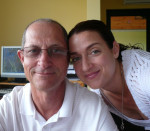
We are ten months into a year-long sabbatical, and I recently posted on Facebook that I was having a ‘travel weary’ day, that I knew the funk wouldn’t last, but at that moment, I just wanted to go home.
One friend asked, “Where’s that?” and it was a good question. I have talked a lot this year about home being wherever lay my head (and where Ben is). I replied, “Just Australia.”
My dad’s comment on the post drew on his own long-term travel. “Once you sense the finish line, you just want to go. Hang in there.”
A friend, who last year completed a year’s sabbatical with her husband, posted, “Been there. Sending love.”
I don’t post this to complain.
This year has been brilliant. When Ben and I look back on the last ten months and all we’ve seen, the people we have met and reconnected with, the places we’ve been to, and all we’ve done and accomplished, it brings us a lot of happiness – even some pride.
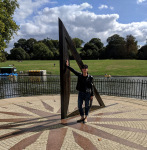
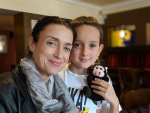
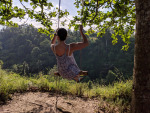


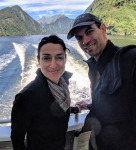


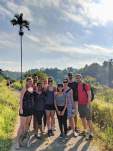

But there are two months left, and I do not want to fritter those away by wallowing in homesickness. Ben and I are united in the belief that we are privileged and brave and must make the absolute most of every day for the next two months.
So, with that in mind, we will continue to get out and see Porto and enjoy the beauty and wonder it has to offer us. We will have a brilliant time with our family in the UK over Christmas and New Year. We will add a side trip or two – Wales looks likely, as does a return to London. We will plan out something spectacular for January (our swan song). And I will finish my third novel.
So again, I do not write this to complain, but to share the reality of sabbatical life. Sometimes, you just want to be home.
November 23, 2018
So, what exactly is #chicklit?
I published my first novel nearly a year ago and I’m about to publish my third. Something I’m often asked—and something I need to define as an author—is what genre I write in.
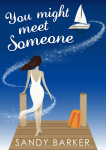
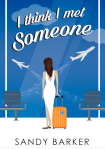
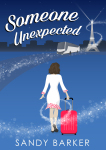
The long answer is ‘Contemporary Women’s Fiction’, but as this broad category also includes authors like Liane Moriarty and Jodi Picoult, whose books are brilliant but very different from mine, I tend to answer ‘RomCom’ or ‘Chicklit’.
RomCom is a little limiting, however, because in each of my books I delve into heartbreak, goodbyes, loss, and other harsh realities of life, like alcoholism and infidelity. The other day, Ben asked me if I was okay because I started sobbing while sitting at my computer. “I’m just writing a sad scene,” I said and he left me to it. My characters live and breathe in my head; when they’re heartbroken, so am I.
That said, I also write a lot of humour into my books. The main characters are funny women. They’re self-deprecating, smart and witty. Their inner monologues, where they ‘say’ whatever they like, are some of the funniest parts of the books.
In short, I write them to be relatable, well-rounded, flawed, and fabulous women—like your best friends, your sisters, your cousins/aunts/mums, like you.
So, is Chicklit a more apt description of the genre I write? Yes and no.
Yes, because fans of the genre know what type of book they’re getting when they buy one of mine—and it’s likely they’ll enjoy it. And I’m in good company in this genre. Take a look at the Goodreads list of most popular Chick Lit titles. You’ll notice some famous bestsellers, like Bridget Jones’s Diary and The Devil Wears Prada.
And no, because it’s (become) a loaded term. For those who don’t really know what it is, who are afraid to dip their toe in the pool, who might love my books and others that sit in this category if they actually read them, there can be the perception that Chicklit = fluffy nonsense.
This is not true.
Sure, like in any genre, books in this category span the entire spectrum from outstanding to atrocious, but the best examples of the genre are fantastic reads. And, like any genre, the lines are fluid. It includes everything from laugh-out-loud comedies (a la Bridget Jones) to heartbreaking tales like JoJo Moyes’ Me Before You.
A way I can narrow down my specific corner of the genre further, is to identify the books that would sit next to mine on the shelf, those ‘people-who-bought-this-book-also-bought…’ books.
My fave Chicklit author—the one who I want my books to sit next to the most—is Lindsey Kelk.
[image error]
She’s written seven (soon to be eight) I Heart books and three Tess Brookes books, as well as several stand-alones. Her writing is fast-paced, funny, heartfelt, and relatable. She’s a full-time author and her books are sold worldwide, and I feel qualified to say this because I’ve read hundreds of Chicklit books, one of the best in the biz.
So, if I was pressed to give the Twitter pitch definition of Chicklit, I would say this:
It’s fiction about women, for women.
That would leave me 204 characters to further explain that men often read and enjoy it, and some of it is written by men, but I stand by my one-liner.
I am also trying (without a lot of traction at the moment) to get ‘travel romance’ to take off as a sub-genre: exploring the transformative effects of travel on the love-weary. But until it becomes mainstream, I’m happy to inhabit my little corner of Chicklit.
November 2, 2018
Character Description Must-Haves
Brilliant advice for writers from KM Allan.
There’s a lot of elements that go into writing a book, and each one has their own set of must-haves.
Take character descriptions, for example. Obviously, the easiest way to create a picture in someone’s mind is to list the physical characteristics. Often it’ll be something like; “She was tall, with long black hair and bangs that sat above her blue eyes, clashing with her pale skin.”
Do you create a picture? Sure, but unless you’re from the Nine-Nine putting out an APB for your solve (can you tell I’ve just discovered the TV show Brooklyn Nine-Nine?), describing your characters like a police description doesn’t do you any favors.
Instead, try digging a little deeper. Think of new ways to work in height, weight, eye color, etc, and mix up the accurate facts with vivid details. Ones that touch on the five senses and include some of these character…
View original post 985 more words
October 31, 2018
A desk with a view
We have now been on sabbatical for nine months, and during that time Ben and I have both worked for our respective clients and I’ve written, edited and published one novel and I’m about 1/4 of the way through writing the next.
While we’ve also made time to explore the different locations we’ve visited or lived in, our working life is a big part of the sabbatical. This is a test case: can we live and work abroad for extended periods of time? We never know, this could become our new normal.
The kind of work we both do – Ben developing software, and me writing and editing content – means we need to work at desks. But ‘desk’ can be any flat surface. Ben’s current stand-up desk set up is an ironing board and the box the vacuum cleaner came in – yes, really.
Most of the time, we either use the dining table of the place we’re staying at, or we go to coffee shops. The coffee shop thing is tricky. The seats have to comfortable enough to sit on for at least a couple of hours, the WiFi has to be good, the coffee can’t suck, and there needs to be a generally good ‘vibe’.
Our fave spot so far in Porto is the cafe at the Concert Hall, which has great seats, fast WiFi and a buzz of energy from the groups of people who gather there to catch up or to work. The coffee sucks, but 3 out of 4 isn’t bad. The other day, when it was still sunny and warm, we worked in the park at a picnic table for a couple of hours – divine.
At the lake cabin, I’d often sit on the porch in an Adirondack chair (I love these) and write, stealing glances at the lake view from time to time. In Bali, my favourite place to work was on the sunlounger next to the pool.
So here are some of my fave desks with a view from the year so far.
[image error]
[image error]

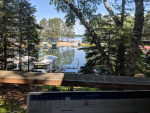
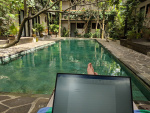

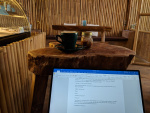

September 30, 2018
Could be anywhere…
[image error]
When you’re living and working around the world – rather than holidaying for a year – the highlight of some days is having a decent cup of coffee.
This is how yesterday, a Saturday in Edinburgh, went:
got up – tea and porridge for breakfast
checked social media, Amazon and Goodreads (unpaid author work) – more tea
started on an editorial project for my client (paid work) – more tea
realised most of the the morning had disappeared and we hadn’t left the house yet (Airbnb accommodation)
moved to a coffee shop where we had decent coffee
worked on the editorial project
had lunch at the cafe – while working
realised we’d been there for two hours and our butts hurt from the chairs
went to the supermarket and got fruit, TP, and stuff for dinner
at home, finished the editorial project
put on a couple of loads of laundry
realised it was five o’clock and opened a bottle of wine and watched Netflix
cooked and ate dinner – had more wine – watched more Netflix
went to bed
A normal day…
We could have been anywhere in the world…
We’re in one of the most beautiful cities in the world and yesterday we saw no more than our local neighbourhood, the inside of a Sainsbury’s and a busy cafe. But I don’t consider days like this a waste. They are a part of being nomads – and once in a while, we just need a day of normal.
And today? We’re off to climb Arthur’s Seat and to explore more of Old Town!
September 25, 2018
Traveller vs Tourist: Things that make you go, hmmm
I have long subscribed to being a traveller over being a tourist.
When I ran tours in Europe in the 90s, I’d start each one with the First Day Spiel. It took a couple of hours and ate up the time it took the coach to get from London to Dover. Much of it was around logistics – these were the days before (most people had) mobile phones and the Internet and the Euro. Travel in Europe was tricky at best and tetchy at worst. We changed money, we crossed actual borders, we used fax machines and phone cards. It was HARD.
But, I’d still finish my FDS with a little pontification about the value of being a traveller over being a tourist.
Travellers embrace differences – cultural, culinary, climate, cash. They are patient, observant, engaged and interested. They’ll understand when the Greek ferry is late and when the only thing to eat is day-old bread and iffy cheese. They will try to learn some of the local language, and will be equally thrilled to see locals zipping about Rome on Vespas as the Colosseum.
Tourists, on the other hand, should just stay home and watch Netflix – or perhaps the Travel Channel. They complain, whine, whinge and generally make life miserable for everyone around them.
For the most part, I had travellers on my tours – I am still friends with some of my former clients – but there were the odd tourists.
So, what category do I fit into this year? I have lived like a local, I have travelled, and I have visited family and friends. I’ve been a digital nomad and for most of the year have had my traveller hat pulled firmly over my brow. BUT, there have been a few tourist moments, when I have devolved into an ugly version of my travelling self – when it has all gotten a bit too much and I’ve indulged in a bit of a whinge.
Bali
[image error]
Campuhan Trail, Bali
Beach and pool clubs in Bali will try to rip you off when it comes to Happy Hour. It’s 2 for 1 drinks, right? Well, that means you get 4 drinks every time you order 2. So, when Ben and I would each order a cocktail, thinking that they were half-price, WRONG! 4 cocktails would show up and we’d be expected to pay for two (not one). It happened so many times, we started clarifying with staff what we were ordering and how much we’d be expected to pay – and even then, they’d still try to dupe us. We’d just send the drinks – all 4 of them.
Ireland
[image error]
Cliffs of Kerry
I got sticker shock when I got to Ireland – and that was coming from England. Everything – and I mean everything – cost a lot more than what we’d typically pay in the US, the UK and Australia, especially public transport, food, drinks, coffee, groceries, accommodation and care hire – you know, basically everything.
I kept doing the conversions in my head – which travellers definitely don’t do – sending myself into the financial equivalent of a diabetic coma. A day-pass on public transit within the Dublin area capped out at 9 euros-something cents. The equivalent in London is 6 pounds-something pence – for London. By the way, that’s about 2 pounds cheaper to travel around London, one of the world’s largest and (I would argue) best cities.
England
[image error]
Prime Meridian, Greenwich
Ahhh, the land of inconvenience. That’s what my dad calls it and he’s English, so he’s allowed. As a half-English, half-American Aussie, I am also (technically) allowed to disparage the sometimes ridiculous inconveniences of England.
Going to the supermarket, for example, is an exercise in futility. Filling the basket or the cart is fine – there are a lot of choices – LOTS – but checking out is AWFUL. At ALDI – yes, the same discount box chain found all over the world – they won’t start scanning the items until you are fully unloaded, because there is literally nowhere to put them once they’re scanned. You must unload, then dash past the cashier with your bags at the ready, so you can catch your groceries as they fly off the conveyor belt. It’s like something out of a Japanese game show.
If this doesn’t appeal to you, try Tesco or Sainsbury’s or Waitrose, where you could gestate a brand new human being while you wait for the seated cashiers to slothenly (I’ve made up this word especially for them) pick up each item, examine it carefully to determine the whereabouts of the bar code, wave it over the scanner and then place it down with far more care than could possibly be required for a box of dishwasher tablets. They should have free WiFi so you can do your taxes while you wait.
The US
[image error]
Seattle
This probably won’t come as much of a surprise and I will risk getting slightly political, but entering trump’s America (note the on-purpose lack of proper noun capitalisation), is super NOT FUN for a non-American, especially one who is on sabbatical for a year, writes books, and doesn’t have a current employer.
I saw three immigration agents on the way into the US at LA. Three!
How long am I going to be here? 89 days (the visa waiver program allows 90 days and I am giving myself a day’s buffer). How did I get my employer to agree to let me travel for that long? I don’t have one. That’s when I was redirected to a supervisor.
So, how are you able to afford being here that long? I work for myself. Uh-oh. Back up the truck. Warning, Will Robinson. You’re working here???
That’s when I got to see the secure room where they take your phone off you.
Fortunately, the supervisor’s supervisor was a reasonable human being and he understood that a digital nomad is essentially self-funded, but may work for clients they have back home from time to time. I was released back into the wild that is LAX.
New Zealand
[image error]
Nothing – it’s perfect. Duh.
September 18, 2018
Guest blog post on Highlands2Hammocks
When Campbell and Gemma from Highlands2Hammocks put the word out that they were looking for guest bloggers, I raised my hand.



I thoroughly enjoyed writing A Surprising Adventure in Ireland and I’m proud to say that all the photos are mine. Enjoy!!
September 11, 2018
Drama Queen: Becoming a Novelist
Since I can remember, I’ve loved writing. I still have my Year 4 composition book and I was quite the short storyist (I also like to make up words). In my teens I wrote a gripping satirical piece on public toilets and started a novel (to date, still unfinished).
At university, while studying a BA in English and majoring in Literature and Theatre Arts, I wrote piercing exposes about sexism in classic novels and the sexualisation of men in Glam Rock – I know, gripping stuff. I wrote angst-ridden monologues, which were somewhat sophomoric considering I was in my early twenties and no longer a sulking teen.
I kept a journal from age twelve, one of those small, but fat diaries with a gold lock that my eight year-old sister could easily pick. I upgraded to bigger and better journals, but stopped journalling about fifteen years ago when I realised I spent more time writing about my life than living it.
All of these writings and musings are where I cut my teeth as an author, but the one thing that has served me best as an author is Drama – my time studying performance and plays, my time on stage, and my time as a Drama teacher.
Drama taught me invaluable lessons I draw on every time I write.
Character motivations
Characters must have a motivation. It’s that simple. They must want something, even if they don’t (yet) know that they want it. Characters can also be their own antagonist – just think of how many people you know who self-sabotage. Any time my writing stalls, I ask myself, what does this character want and what will they do to get it?
Character arcs
Not only do characters need a motivation, they must move – and I don’t mean that they need to join a dance class or change their address. Characters – particularly the protagonist – must develop, grow, or change in some way. They must have an arc. They should be different at the end of the story from when the reader first meets them. It’s good for me as a writer to be able to articulate that continuum of growth, that arc.
Back stories
Acting taught me of the importance of back stories. Characters – again, particularly protagonists – need to be as fully fleshed out as possible. They should have histories and there should be reasons for their personality traits, their motivations, their flaws, their relationships. As a writer, I must create histories for my characters, so they ring true to readers.
Setting
In a play, there’s a great deal of attention to setting – how characters interact with it, how it’s referred to and how it is staged. On paper, a richly-developed setting can become almost a character in itself. And how characters engage with the setting can evoke a specific tone or mood. As I travel avidly, I tend to write about places I know well and aim to capture what it is like to be in those places.
Dialogue
I have received some terrific feedback on the realism of my dialogue, which I greatly appreciate because I tend to use a lot of it and I work hard to make it sound A) true to each character and B) natural and realistic.
Writing plays in the noughties helped me develop this skill. I was teaching at a girls’ school and was seeking out plays for student productions. There’s a dearth of well-written, easy-to-stage ensemble pieces which are appropriate for high school students – especially for an all-female cast. So, I wrote plays. (They since been published on Drama Notebook in the US and have been performed by schools in Australia, the UK and the US.)
I also hone this skill every time I work on one of my novels. Once I finish a conversation, I read it aloud as the characters (with voices – I can’t help myself), and tweak the phrasing, words, tone and inflections. My aim is to make it seem like a real conversation that I happened to capture in print.
Scenes
I follow a lot of authors on social media through Twitter, Facebook, blogs and websites, and I’ve been pleased to see more and more discussions about writing in scenes. Rather than focussing on chapters, the author focuses on a scene where something specific happens – just like in a play. A scene could comprise a whole chapter, or it might be part of one.
I realised recently that as a novelist I always write in scenes – again, perhaps a throw-back to writing plays. It is easier for me to approach the over-arching story in smaller, self-contained chunks. As a reader, I’ve seen a shift in writing towards this format. Likely you’ve seen this too – authors denote the end of a scene within a chapter with a double space or a physical page break that looks something like this:
~~~~~~~~~~
Where I used to have to finish reading a whole chapter before putting a book down, I can now get to the end of a scene and feel like I have a natural place to pause.
A quick nod to grammar
I mentioned that I studied Literature as well as Theatre Arts and it was through my Lit classes that I began my love affair all things grammar. I have since taught English and worked as a professional editor. It means I can conduct decent and thorough editorial passes at my own writing before handing off to a(nother) pro (always get another pair of eyes on a manuscript).
And a quick nod to my contemporaries
A good writer reads. A good writer reads widely. A good writer reads voraciously.
Reading teaches you what to do and what not to do – how to evoke time, place, passion, fear, love, loss and the human condition – how to avoid over-using a word – how to structure a phrase, a sentence, a chapter, a thought – how to make your readers laugh aloud and weep onto the page – how to play with words and ignore the rules for effect.
I want to be a good writer – sorry, make that a great writer – so I read. Every day. Across genres. Indie authors and famous authors.
August 16, 2018
Mid-way through our mid-career sabbatical
[image error]
Last day in Seattle
At the end of 2017, I posted about our 2018 sabbatical. Ben and I embarked at the beginning of February, so last week marked the mid-point of our year of living abroad. In that time, we have visited friends and family, explored new locations, lived life like a local and have worked remotely.
Here are some of my reflections and lessons learned from the mid-point of our sabbatical.
[image error]
Exploring northern MN with the Doctor
Home (really is) is a state of mind
Just before we left the US to begin our UK/EU stint, I fell very ill and had to spend a night in hospital. After 40 hours in a hospital gown, my vitals being checked every two hours, and being tethered to an IV stand, all I wanted to do was go home. At that stage in our travels, home was Ben’s grandmother’s house, and when I arrived back there – still, weak, tired, and yet to fully recover – I was ecstatic. I was home.
Home has been various places in our travels. With my bed count for the year sitting at 27 (Ben’s is 26, because he hasn’t sleep in a hospital bed), home really has become a state of mind. That’s not to say that all of those beds felt like home; it means that when we have taken side trips for a few days and returned to our longer-term accommodation, I have had an overwhelming sense of returning home – and that feeling is marvelous.
So, at our mid-way point I continue to subscribe to the ‘wherever I lay my head’ philosophy I posted about here.
[image error]
Chicago with our dear friend from Bali days, Kelley
It’s possible to get a lot done while you’re travelling
When we meet new people or catch up with family and friends, we invariably end up discussing the ins and outs of sabbatical life. The most frequent clarification during these conversations is that taking a sabbatical is not ‘being on holiday’ for a year.
Ben and I both have our own companies in Australia and consult for clients – Ben in an ongoing capacity and me on project-based work. There have been many weeks where we’ve worked full-time, or close to it. This type of work suits us both, as we can carve out the time to do it around our larger plans, we can take advantage of coffee-shop WiFi, we both enjoy working in a variety of environments, and – to be frank – it helps fund this year abroad.
Additionally, since we left Melbourne, I have written and published my second novel. And I am soon to start my third! I love writing, I love writing novels, and I love writing ‘on the road’. Plus, each new location, each new friend, each conversation with a loved one, each excursion and adventure could be the kernel of an idea for book #4 – and the ones after that.
[image error]
Meeting my favourite author, Lindsey Kelk (Birmingham, UK)
Things are just…things
When we left Bali in May, we left behind many of the things we’d bought to make Bali life a little easier – storage containers, coat hangers, food staples, Costco-sized toiletries. We did the same thing when we left Minnesota, with the addition of some red wine glasses, a life-time supply of sunflower seeds we barely made a dent in, and a yoga mat. We also filled a large bag with summer clothes which we dropped into a charity donation bin. Clothes I previously had ‘loved’ were tossed aside without any remorse.
It’s just stuff – and we’re travelling light.
[image error]
With my nephew, Alexander (UK)
It’s going fast
I truly cannot believe we’re half-way. Since leaving Melbourne, we’ve been to New Zealand, two other states in Australia, Bali, three states in the US, and the UK. Next week, we’re off to Ireland and we are starting to firm up our plans for Scotland, Amsterdam, Paris and Portugal.
I know that before we know it, we will be on our way back to Melbourne for Australia Day 2019 (January 26). That date is important, because Ben will be attending a citizenship ceremony to become a fully-fledged, dinky-di Aussie (I am so proud).
The speed with which this year away is rocketing by, means that we must continue to seek out and enjoy the small pleasures. We must continue to take every opportunity to explore, live like a local, see people who are dear to us, meet new friends, and accomplish great things.
Because, ultimately, that’s what this year is about – living life to the fullest.
[image error]
Secret Beach Day Trip (Bali)




